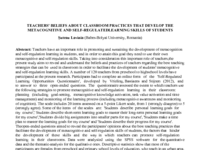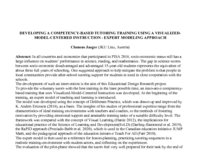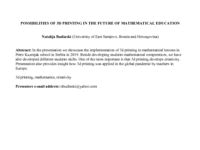Doctoral Students' Conference: Tradition, Development & Innovation in Didactics (TDID)
Organized online between 14-16 May 2020 by:
"Didactics: Tradition, Development & Innovation” Doctoral School at Babeș-Bolyai University & Linz School of Education at Johannis Kepler University.
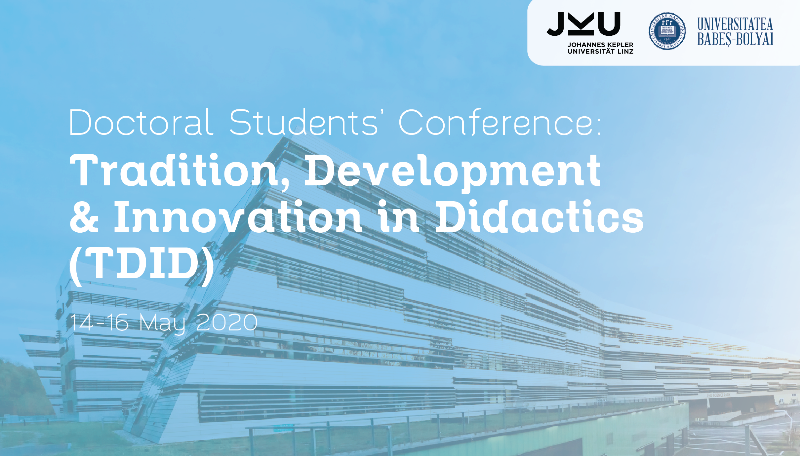
SCIENTIFIC COMMITTEE
Ciascai Liliana, Babeș-Bolyai University, Romania
Cuznețov Larisa, Pedagogical State University “Ion Creangă“, Republic of Moldova
Dana-Picard Noah, Jerusalem College of Technology, Israel
Diego-Mantecon Jose, Universidad de Cantabria, Spain
Fenyvesi Kristóf, University of Jyväskylä, Finland
Hershkovitz, Center for Educational Technology, Israel
Ilovan Oana-Ramona, Babeș-Bolyai University, Romania
Kopp Erika, Eötvös Lóránd University, Hungary
Korenova Lilla, Comenius University in Bratislava, Slovakia
Lavicza Zsolt, Johannes Kepler University, Austria
Liptai Kálmán, Eszterházy University, Hungary
Magdaș Ioana, Babeș-Bolyai University, Romania
Nistor Nicolae, Ludwig-Maximilians University Muenchen, Germany
Opriș Dorin, "1 Decembrie 1918" University of Alba Iulia, Romania
Péntek Imre, Babeș-Bolyai University, Romania
Pinto M. A. Carla , Porto University, Portugal
Ravanis Konstantinos, Patras University, Greece
Stanciu Ionuț Dorin, Technical University of Cluj-Napoca, Romania
Steinbeiß Gregor, University of Education Upper Austria, Austria
Vajda Barnabás, Selye J. University, Slovakia
Zsoldos-Marchis Iuliana, Babeș-Bolyai University, Romania
ORGANIZING COMMITTEE
Ciascai Liliana, Babeș-Bolyai University, Romania
Cristea Mădălina, Babeș-Bolyai University, Romania
Erdei Edina, Babeș-Bolyai University, Romania
Haas, Ben, Johannes Kepler University, Austria
Kristinsdóttir Bjarnheiður, University of Iceland, Iceland
Lavicza Zsolt, Johannes Kepler University, Austria
Magdaș Ioana, Babeș-Bolyai University, Romania
Opriș Dorin, "1 Decembrie 1918" University of Alba Iulia, Romania
Pop Cristina-Florina, Babeș-Bolyai University, Romania
Rahmadi Imam Fitri, Universitas Pamulang, Indonesia
Sabou (Baboș) Ioana-Aurelia, Babeș-Bolyai University, Romania
Steinbeiß Gregor, University of Education Upper Austria, Austria
Stier Sophia Gerrick, Johannes Kepler University, Austria
Turșan Vasile Grigore, Babeș-Bolyai University, Romania
Zsoldos-Marchis Iuliana, Babeș-Bolyai University, Romania
REGISTRATION
PhD students can present their work in short, 10 minutes long presentations.
For registration, please, fill in the form:
https://docs.google.com/forms/d/e/1FAIpQLSdDLsIgiH26uQtaX3h6zwg_0YiysIzbo_KMC_yoq9rol_V8jg/viewform
Deadline: 11 May 2020 for Presenters. 13 May 2020 for participants.
PROGRAM
14 May 2020, Thursday
13:30 – 13:40 Opening of the conference
- Soós Anna, Vice-rector of the Babes-Bolyai University
- Opre Adrian, Dean of the Psychology and Educational Sciences Faculty, Babes-Bolyai University
- Lavicza Zsolt, Professor, Linz School of Education at Johannes Kepler University
- Carla M. A. Pinto (Porto University, Portugal): DrIVE-MATH: a journey to actively engage Engineering students in Math
- Șuteau Lavinia (Babeș-Bolyai University, Romania): Teachers' beliefs about classroom practices that develop the metacognitive and self-regulated learning skills of students
- Haas Ben (Johannes Kepler University, Austria): STEAM Education in elementary school: A holistic investigation on technology enhanced teaching and learning
- Jenák Ildikó (University of Pécs, Hungary): Teachers’ role and possibilities in students’ digital enculturation
- Shereen ElBedewy (Johannes Kepler University, Austria): Application of Transformations on Architectural Models
- Steinbeiß Gregor (University of Education Upper Austria, Austria): Becoming a Teacher – Factors Influencing the Development of Beginning Student Teachers’ Professional Identities
- Bora Temel (Hacettepe University, Turkey): Examining the Properties of Gamification Tools for Education
16:15 – 17:50 Short presentations 2
Session Chair: Cristea Mădălina & Zsoldos-Marchis Iuliana (Babeș-Bolyai University, Romania)
- Jaeger Clemens (Johannes Kepler University, Austria): Developing a competency-based Tutoring Training using a Visualized-Model-Centered Instruction - Expert Modeling approach
- Erdei Edina (Babeș-Bolyai University, Romania): The self-regulation of motivation in case of primary school pupils
- Aikaterini Draganoudi (Patras University, Greece): Representations of kindergarten teachers about the practices they follow during the implementation of activities by the Natural Science
- Aye Myint Lay (Eötvös Lóránd University, Hungary): The evaluation of teacher performance in higher education
- Cohen Shirly (Babeș-Bolyai University, Romania and Talpiot College, Israel): Factors and parameters affecting the success of students’ achievements in the field of mathematics: a comparative study between Israel and Finland
- Ackerlauer Petra (Johannes Kepler University, Austria): Data feedback for individual learning progress planning with QUOP - A qualitative research project understanding factors of successful transformation of data feedback into development measurements in Upper Austrian primary schools
- Cristea Mădălina (Babeș-Bolyai University, Romania): The Involvement of Romanian Pre-university Teachers in Lifelong Learning: A Comparative Analysis
15 May 2020, Friday
9:00 – 10:00 Discussions
- Mathematics and culture. Noah Dana-Picard (Jerusalem College of Technology, Israel) and Sara Hershkovitz (Center for Educational Technology, Israel)
- Jose Diego-Mantecon (Universidad de Cantabria, Spain) & Zsolt Lavicza (Johannes Kepler University): Survey research
- Budinski Natalija (University of East Sarajevo, Bosnia and Herzegovina): Possibilities of 3d printing in the future of mathematical education
- Jablonski Simone (Goethe University Frankfurt, Germany): Mathematical Argumentations from a Longitudinal Perspective - Identifying Types, Problems and Relations to Giftedness
- Sanjida Akter Tanni (Green University of Bangladesh, Bangladesh): Exploring Challenges & Scopes for the Adaptation of Online Classes of Higher Education during Emergencies of COVID-19: Bangladesh Perspective
- Teo Oi Mei (Johannes Kepler University, Austria): Designing Arts-integrated Mathematics learning tasks using GeoGebra
- Kübra Ertan (Hacettepe University, Turkey): The Views of Students about Gamification in an EFL Context
- Kiladze Anna (Georgian Technical University): Constructing Geometrical artworks and Their connection with STEAM Education
- José Ronaldo Alves Araújo (Pontifical Catholic University of São Paulo, Brazil): A study of Transnumeration processes mediated by GeoGebra
9:00 – 9:10 Opening of the Romanian thread
- Ciascai Liliana, Director of the Doctoral School “Didactics. Tradition, Development, Innovation”
- Magdaș Ioana, Vice-dean of the Psychology and Educational Sciences Faculty, Babes-Bolyai University
- Stanciu Ionuț Dorin (Technical University of Cluj-Napoca, Romania): Questionnaire design
- Nistor Nicolae (Ludwig-Maximilians University Muenchen, Germany): Learning analytics in higher education
- Filipski Tatiana (Pedagogical State University “Ion Creangă“, Republic of Moldova): Praxiological aspects of museum education in context of educational institutions- museum- family collaboration
- Babut Teodora Mirela (Babeș-Bolyai University, Romania): Brainstormingul şi strategiile didactice moderne în educaţia preşcolară
- Gârțu Maria-Livia (Pedagogical State University “Ion Creangă“, Republic of Moldova): Forming social positivity in young school children according to parental style
- Miclea (Stan) Loredana-Alina (Babeș-Bolyai University, Romania): The „semaphore” method in the context evaluation - self-assessment of preschoolers
- Pereu Tatiana (Pedagogical State University “Ion Creangă“, Republic of Moldova): Personal efficiency of adult family members
- Vereș (Segedi) Sanda (Babeș-Bolyai University, Romania): The role of animation films in teaching science lessons to first grade students
- Bondar Nicusor (Pedagogical State University “Ion Creangă“, Republic of Moldova): The efficiency of using modern technology in education
15:30 – 17:15 Short presentations 5 – in Romanian
Session Chair: Pop Cristina-Florina & Ilovan Oana-Ramona (Babeș-Bolyai University, Romania)
- Sabou (Baboș) Ioana-Aurelia (Babeș-Bolyai University, Romania): The interest of the teachers in the primary education for the activities based on the theory of multiple intelligence
- Sanduleac Sergiu (Pedagogical State University “Ion Creangă“, Republic of Moldova): Perspective of scientific thinking development in pupils and university students in key principle of “Future School”
- Ilie Ana- Simona (Babeș-Bolyai University, Romania): The use of educational films in primary school nature science lessons
- Butnari Nadejda (Pedagogical State University “Ion Creangă“, Republic of Moldova): Spiritual Intelligence in Higher Education
- Antal Maria Irina (Babeș-Bolyai University, Romania): Teachers’ beliefs and perceptions about the use of photographs in natural science classes
- Kerekes Jenő (Babeș-Bolyai University, Romania): Technical-scientific activities within children's palaces and clubs, educational alternatives for the formation of competences in science and technology
- Oloieru Anastasia (Pedagogical State University “Ion Creangă“, Republic of Moldova): Psycho-pedagogical requirements for economic culture formation in preadolescents
- Pasca-Tusa Angela (Babeș-Bolyai University, Romania): Deep Learning or Surface Learning?
13:00 – 13:05 Opening of the Hungarian thread
- Zsoldos-Marchis Iuliana, Professor, Babeș-Bolyai University, Romania
- Kristóf Fenyvesi (University of Jyväskylä, Finland) & Kálmán Liptai (Eszterházy University, Hungary): Exploring New Sources for Mathematics and Art Education through the Children's Eyes: Children and Youth Mathematical Art Exhibits around the World
- Kocsis Zsófia (University of Debrecen, Hungary): Features of student employment in the eastern region of the European Higher Education Area
- Juhász Ana (Babeș-Bolyai University, Romania): Primary school teachers' attitude to board-games and their board-game playing practice
- Kelemen Gabriella (University of Debrecen, Hungary): Tradition and innovation – church and state education in the Eastern Hungarian region
- Nagy Tibor (Selye János University, Slovakia): History textbook research based on history didactics
- Kocsis Zsófia (University of Debrecen, Hungary): The role of voluntary and paid work of higher education students in the engagement to study
- Hari Tünde-Hajnalka (Babeș-Bolyai University, Romania): Primary school teachers' attitude and beliefs about game based learning
- Bese László (Selye János University, Slovakia): Analysis of the current History textbooks in Slovakia from the point of view of the concepts of collective self-image and enemy images
- Barabás Andrea (University of Debrecen, Hungary): Relationships between educational effectiveness and settlement types
15:30 – 15:45 Keynote 5 – in Hungarian
- Korenova Lilla (Comenius University in Bratislava, Slovakia): Use of Augmented Reality in STEAM Education
- Capătă Oana-Cristina (Institut Superieur de Pedagogie Galilee, Belgium) & Liliana Ciascai (Babeș-Bolyai University, Romania): Educational game design
CALENDAR AND TIME ZONE
The conference runs in Central European Time.
Refer to the calendar for your local time.
CONFERENCE MEDIA
 The conference is organised via Zoom. Registered presenters and participants will receive an email with further information about the Zoom ID dan password.
All presentations will be uploaded on our YouTube channel after the conference:
https://www.youtube.com/c/LinzSTEAMEducation
Please kindly subscribe to the channel to get updates.
The conference is organised via Zoom. Registered presenters and participants will receive an email with further information about the Zoom ID dan password.
All presentations will be uploaded on our YouTube channel after the conference:
https://www.youtube.com/c/LinzSTEAMEducation
Please kindly subscribe to the channel to get updates.
 The conference is organised via Zoom. Registered presenters and participants will receive an email with further information about the Zoom ID dan password.
All presentations will be uploaded on our YouTube channel after the conference:
https://www.youtube.com/c/LinzSTEAMEducation
Please kindly subscribe to the channel to get updates.
The conference is organised via Zoom. Registered presenters and participants will receive an email with further information about the Zoom ID dan password.
All presentations will be uploaded on our YouTube channel after the conference:
https://www.youtube.com/c/LinzSTEAMEducation
Please kindly subscribe to the channel to get updates.PUBLICATION
Original articles (with research unpublished yet) in English will be published in a special issue of the Acta
Didactica Napocensia journal http://adn.teaching.ro/. This journal is included in important databases, as Erih+, ERIC, EBSCO, ProQuest, DOAJ.
Deadline for sending the paper: 31 July 2020.
SPEAKER'S SHORT BIO AND PHOTOS
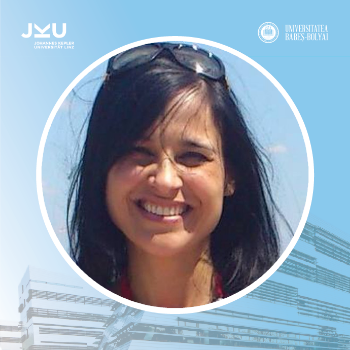 | 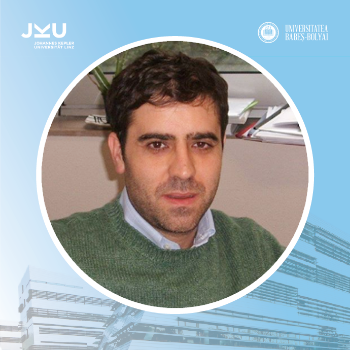 | 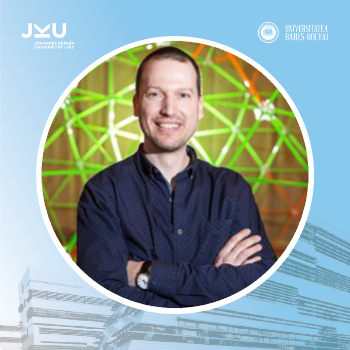 |
| Carla M.A. Pinto, Adjunct Professor, PhD - Subdirector of the Department of Mathematics ISEP (Instituto Superior de Engenharia do Porto) & Center of Mathematics, University of Porto Homepage: http://www.fc.up.pt/pessoas/cpinto | Jose M. Diego - Mantecón received his M.Phil. and Ph.D. degrees in mathematics education from Cambridge University (UK). He is currently working from University of Cantabria and he has large experience on developing and working on international projects. | Kristóf Fenyvesi, PhD (b. 1979) – is a researcher of STEAM (Science, Technology, Engineering, Arts and Mathematics) Trans- and Multidisciplinary Learning and Contemporary Cultural Studies in Finland, at the Finnish Institute for Educational Research, University of Jyväskylä (https://ktl.jyu.fi/en). |
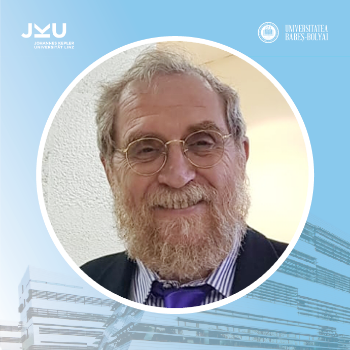 | 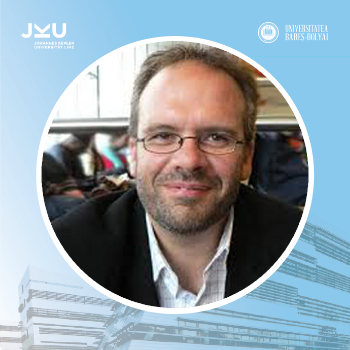 | 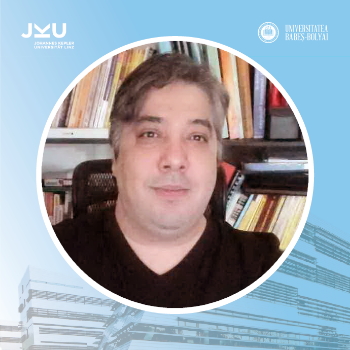 |
| Noah (Thierry) Dana-Picard is a Professor of Mathematics at Jerusalem College of Technology (JCT). He has two Ph.D.s, one from France and one from Israel. Since he finished his period as president of JCT, he is the director of a Chair for Mathematics, Education, and Judaism. He is an active researcher in Mathematics, Mathematics Education with a strong orientation to ICTs and STEAM Education. | Zsolt Lavicza is a university professor in STEM education research methods at the Department of STEM Education, Linz School of Education, Johannes Kepler Universität Linz Austria. He has worked on several research projects examining technology and mathematics teaching in classroom environments. He has greatly contributed to the development of the GeoGebra community. | Dorin Stanciu is a psychologist by training and by vocation. He is working as a teacher and researcher at the Technical University of Cluj-Napoca. His research interests include digitalization of learning, technology acceptance, and all things cyberpsychology. He loves statistics and machine learning and believes in what the data say. He also believes there are no overarching dogmas in research and that psychology and mathematics are siblings. |
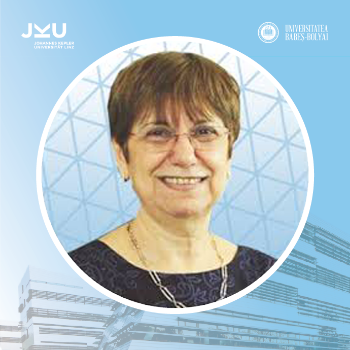 | 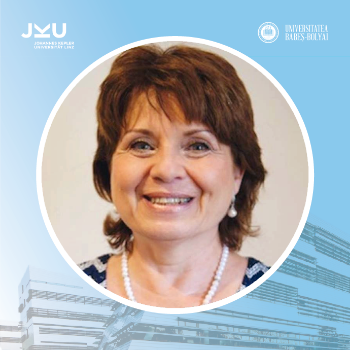 | 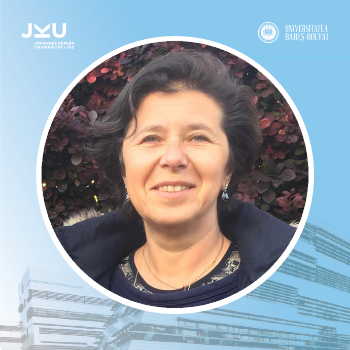 |
| Sara Hershkovitz is a professor retired from The Center for Educational Technology (CET) In Israel, after 4 decades. She participated in International Research and Development groups, lectured in dozens of national and international conferences, and published books and research papers in the field of Mathematics Education. | Lilla Korenova is an associate professor of Mathematics and Computer Sciences at the Department of Didactics of Natural Sciences in Primary Education of the Faculty of Education, Comenius University in Bratislava, Slovakia. She supervised more than 60 research, bachelor, diploma, and doctoral projects, co-authored many papers and books. | Capătă Oana Cristina is an assistant professor at Institut Superieur de Pedagogie Galilee from Brussels, Belgium. She has studied in IT Engineering and Educational Sciences. She is working in Mathematics Education, and her main preoccupation is to find the relations between theory and practice when teaching Mathematics. |
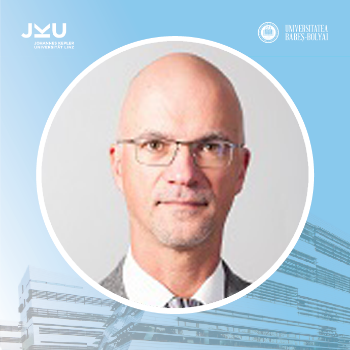 | 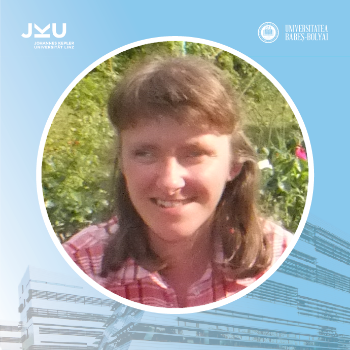 |  |
| Nicolae Nistor is a professor at Ludwig-Maximilians-Universität München, Germany, Faculty of Psychology and Educational Sciences. He studied Electrical Engineering at Politehnica București, after which followed the doctorate and the professorial dissertation (Habilitation) in Educational Sciences. His main research topic is teaching and learning in digital environments, including learning analytics. | Zsoldos-Marchis Iuliana is a professor at Babes-Bolyai University, Pedagogy, and Applied Didactics Department. She is working in Mathematics Education, and her current research is related to gamification and board-games in teaching Mathematics. | Are you the next speakers? |
